‘Dark momentum’: Experts sound grim warning over global threats facing Australia in 2025
Experts have sounded the alarm over the terrifying threats facing the nation – and the world – in the months ahead.
World
Don't miss out on the headlines from World. Followed categories will be added to My News.
2024 was a year full of surprises. 2025 will be one of worries.
Ukraine has turned the tables on Russia, surging its troops over the border and into the Kursk region. And yet, its troops are gradually being ground back elsewhere.
Israel has all but flattened Gaza and large parts of Lebanon. And yet, there is still no plan for a lasting peace between the diaspora and Nakba.
Dictator Bashar al-Assad has been forced to abandon Syria. And yet, the Islamic State and Iranian-backed terror organisations still lurk in its deserts.
South Korea’s President Yoon Suk Yeol has been arrested after declaring martial law to bypass parliament. And yet, North Korea’s Kim Jong-un is in his most powerful position yet.
Then there’s Ukraine. The South China Sea. And Greenland.
To Australia, the world’s trouble spots all seem so far away. And yet, its future is almost entirely dependent upon what happens there.
And that is deteriorating. Fast.
“We should be worried, even more so because the government and bureaucracy have no idea what to do about this situation,” argues Australian strategic analyst Peter Jennings.
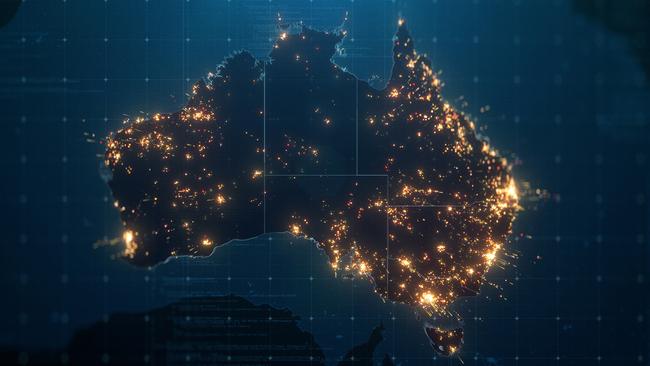
“As a country we need to be more focused on the big strategic events building a dark momentum around us. As voters, we should demand more from governments to strengthen our security. As individuals, we need to think about how to protect our families, our communities, our businesses and about how to plan for disruption.
“Like it or not, understand it or not, that’s our future.”
Disruption. Espionage. Sabotage.
All are emerging as the favourite tools of modern diplomacy.
“Leaders in Beijing and Moscow know that the period from now until the mid-2030s is their best chance to dismantle the prevailing international order,” says Chatham House think-tank analyst William Freer.
“2025 will be the year where leaders will have to decide whether a serious change in course is required.”
But predicting the future has never been an actual science. Or even an art.
Eagle-eyed hindsight reveals some events – such as the sudden collapse of Syria – should have been eminently foreseeable.
So what about Mexico? Or Greenland?
“Of course, if the past is prologue, the year ahead will be filled with surprises – some good, some bad – that no one will have predicted,” states Michael Froman, president of the Council on Foreign Relations (CFR).
“In 2025, the old cliche will certainly hold true: expect the unexpected.”
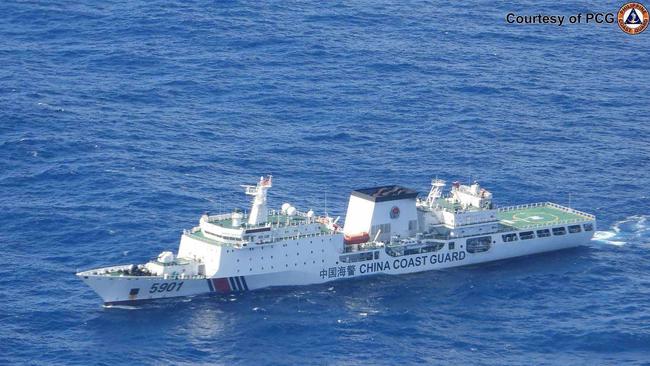
Australia: A world of pain
From Australia’s perspective, 2024 wasn’t too bad. If you don’t take housing and interest rates into account.
Iron ore prices did begin to fall as expected. But only after months of being propped up by inexplicable anticipation of a Beijing bailout of its already over-inflated property bubble.
The last coercive Chinese trade bans, imposed after former Prime Minister Scott Morrison sought an inquiry into the emergence of the Covid-19 virus, were lifted. Diplomatic contacts between Canberra and Beijing were revived.
But beneath the veneer of reconciliation was a simmering tension.
Australia’s intelligence agencies warned of Chinese-based espionage and political interference operations. A Chinese fighter dropped flares in front of an Australian navy helicopter operating near South Korea. And criticism of Canberra’s determination to push the AUKUS nuclear submarine and military technology exchange pact has steadily mounted.
Whatever government forms after Australia’s federal election, relations with Beijing in 2025 are likely to become increasingly complicated.
However, the same can be said of Washington DC.
“Internal analysis by the Reserve Bank of Australia has already forecast a dire impact on the nation’s finances should an ‘extreme’ trade war break out between the United States and China,” warn University of Technology Sydney Australia-China Relations Institute analysts Dr Corey Lee Bell and Elena Collison.
“Others fear US protectionism will deal broader damage to the global liberal trading order that has fuelled Australia’s prosperity.”
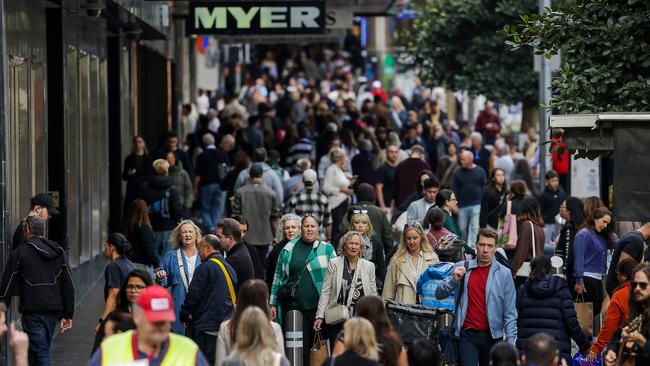
As Australia’s iron ore cash cow dries up amid falling demand and a shift towards low emission steel production, the old “dig it and ship it” entrepreneurs are looking towards critical minerals.
This is already a source of significant international tensions.
China, the US, Russia and Europe are engaging in an intensifying battle to control the flow of materials critical for a hi-tech future. This is set to escalate further under the new US President Donald Trump.
“Australia is both a major producer of critical minerals and a member of the US-led, Western Minerals Security Partnership, which aims to counter China’s dominance in the critical minerals sector by developing diverse and sustainable critical energy minerals supply chains,” the Australia-China Relations Institute analysts state.
“The current reality is that China, which dominates refinery and processing, remains the most important export market for Australian raw materials, and a still-important investor in mining capacity.”
Australia: In our backyard
“The US will look to Japan and Australia for military support,” predicts Jennings.
“Offering to send a ship will not pass any credibility test in Washington. There is no opt-out choice for Australia. China’s long-range missiles can reach all our military bases, intelligence facilities and population centres.”
The world has shrunk. Nowhere is this more evident than in Southeast Asia. The South China Sea is a global shipping nexus, and the web of global airline routes also funnels over this disputed region.
Beijing has been relentlessly ramping up military and diplomatic pressure on its neighbours there for the past decade. And that pressure has been steadily spreading further into the South Pacific.
The Philippines has decided to dig in its heels.
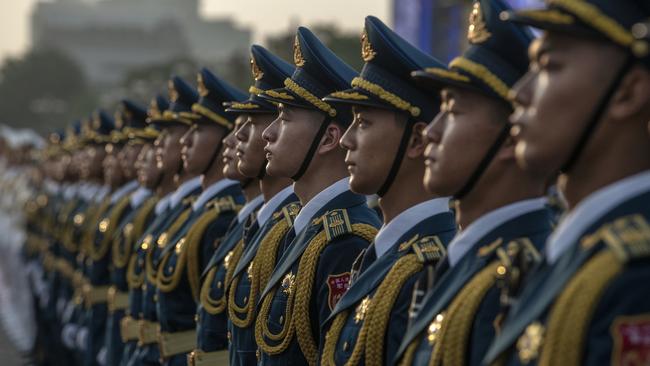
Japan and South Korea are openly protesting China’s incursions.
Vietnam, Indonesia and Malaysia are playing a more behind-the-scenes game.
India, however, appears to have sought an “understanding” over its disputed Himalayan territories.
Australia has close economic, military and historical ties with most of these nations.
“While Australia does not share a mutual defence treaty with the Philippines, it has expanded military ties with the Southeast Asian nation and has over the last two years participated in a significant number of joint bilateral/multilateral patrols and military exercises with Philippines forces,” say Lee and Collison.
“This raises the risk of Australia becoming entangled in potentially lethal clashes involving Chinese military or coast guard assets.”
Beijing, however, has its own agenda.
“China remains preoccupied with Taiwan,” adds the CFR’s Froman.
“China (has) held its largest maritime military exercises in decades. Involving nearly ninety vessels, the drills seemed designed to send the message that Beijing had the power to blockade the island and prevent US allies from coming to its rescue.”
Australia is one of those allies.
Mexico: Out of left field?
“During US President Donald Trump’s first term, one often heard that his statements should be taken ‘seriously, but not literally’. Therefore, it’s surprising that so many people ignore the risk of conflict in one area where Trump has threatened the use of military force both literally and seriously: his threat to invade Mexico,” argues Stimson Center analyst Emma Ashford.
Many Latin American nations have long struggled with the chaos of authoritarian governments and all-pervasive crime gangs.
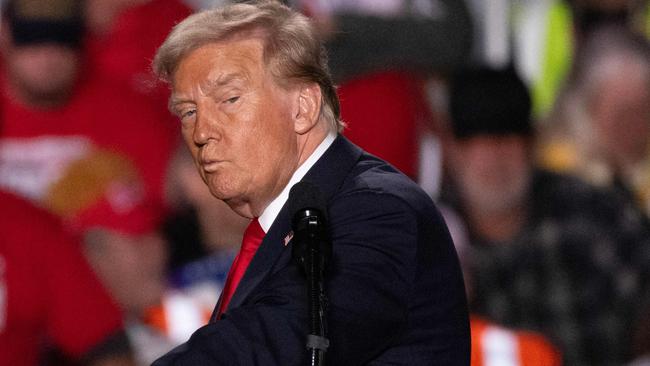
Now, they have to enable the transit – or absorb – millions of migrants fleeing Venezuela and other regional hotspots.
This is the cause of the United States’ “border crisis”.
But it’s also a highway for the international drug trade.
Both are central planks in President-elect Trump’s political platform.
Over the past year, Trump has stated he wanted to launch special forces deep into narco gang-controlled territory. He’s suggested using drones to assassinate cartel leaders.
“If the US military can conduct drone strikes inside Pakistan, Yemen, or Somalia without permission from their governments – so the logic goes – then why not Mexico?” argues Ashford.
“If the incoming president’s statements and inclinations mean anything, the possibility that the Trump administration will engage in military action in Mexico in 2025 is a threat to be taken both seriously and literally.”
Europe: A secret war
“The Kremlin has clearly ratcheted up efforts to intimidate and coerce Europe, hoping to frustrate – and ultimately force an end to – Western support for Ukraine,” says Professor John Deni of the US Army War College’s Strategic Studies Institute.
“But what if Putin orders his minions to turn the temperature up even more?”
Several internet, gas and electricity cables crossing the Baltic Sea between Finland, Sweden, Denmark, Germany and others were severed last year. Most involved Russian or Chinese merchant vessels “dragging” their anchors.
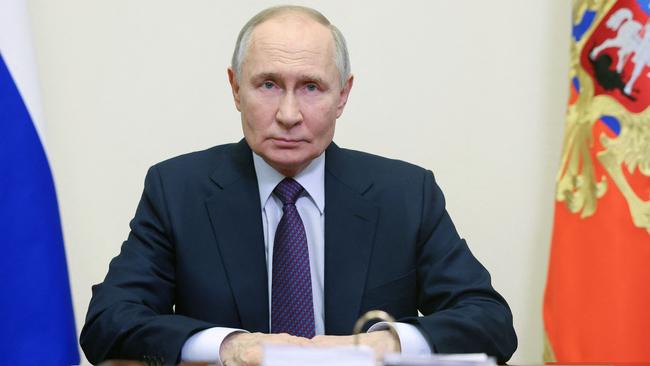
But elsewhere across Europe, Russian agents have been arrested on charges of attempted assassination, sabotage and espionage. Drones have been spotted over sensitive military installations. And concerted internet and social media disinformation campaigns have been sowing chaos among local politics.
“It could all start if Putin senses the right opportunity, such as an increasing American indifference toward Europe,” Deni adds.
Attacks, he adds, are likely to be directed towards politically unstable countries – such as France, Belgium or Romania.
And these attacks will be tailored under a cloak of plausible (or even implausible) deniability.
“For example, an unattributable kamikaze drone or a debilitating cyber-attack against a major power plant or a critical electrical substation; the introduction of disease-spreading pathogens into a water treatment plant; or deep-fake videos depicting a centrist political candidate engaged in corrupt activities at the height of an election campaign could all cause substantial damage and disruption,” Deni warns.
Putin: A fight for survival
“The Russian leader has largely exhausted his military options. You’re in trouble when malnourished and worm-infested North Korean peasants (yes, even the special forces) are the best available troops,” says Jennings.
But the Ukraine war shows little sign of ending soon.
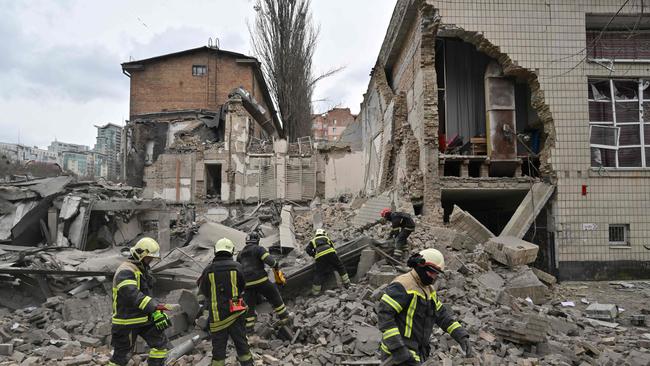
“Rather than end, the conflict may well escalate in 2025,” warns Froman.
“Over the course of next year, Putin will likely face mounting domestic problems. Russia’s central bank has forecast economic growth of 0.5 to 1.5 per cent in 2025, down from 3.5 to 4 per cent in 2024, suggesting that the wartime boom may have run its course.”
And Mr Putin’s closest pals are in it for the money.
“How long will Russia’s oligarchs and the military keep supporting Putin? As we saw in Syria, invincible-looking repressive regimes can fall very fast,” adds Jennings.
“Putin’s survival teeters between Xi’s backing and coerced domestic support.”
But Mr Trump’s return to power may produce a counterbalance.
He’s expressed weariness with the cost of supporting Ukraine’s effort to resist Putin’s invasion forces. And he’s promised to end the war on “Day One” of his presidency. But, so far, attempts to establish a face-to-face meeting with Mr Putin appear to have been rebuffed.
If Mr Trump pulls Washington’s support for Kyiv, President Volodymyr Zelensky will be totally reliant on the fractious European Union to step up its support. Without it, he may be forced to surrender much of the east of his country in the face of falling morale and rising losses.
North Korea: Moment of opportunity
“If Kim strikes, the risk is high that Seoul would feel forced to either accede to Kim or respond disproportionately and unilaterally show strength and force Kim to back down. Either outcome could destabilise the entire region,” warns the Atlantic Council’s Indo-Pacific Security Initiative director Markus Garlauskas.
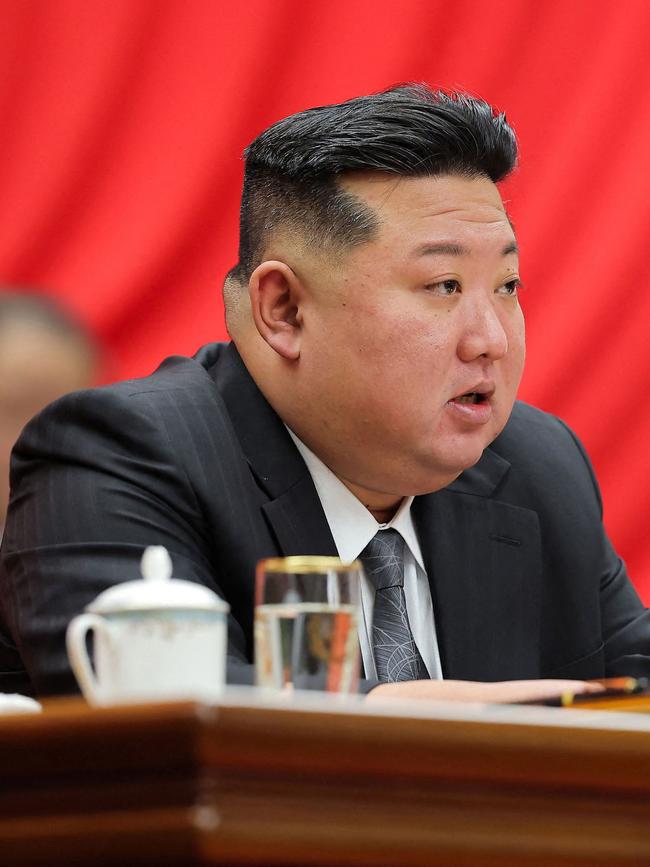
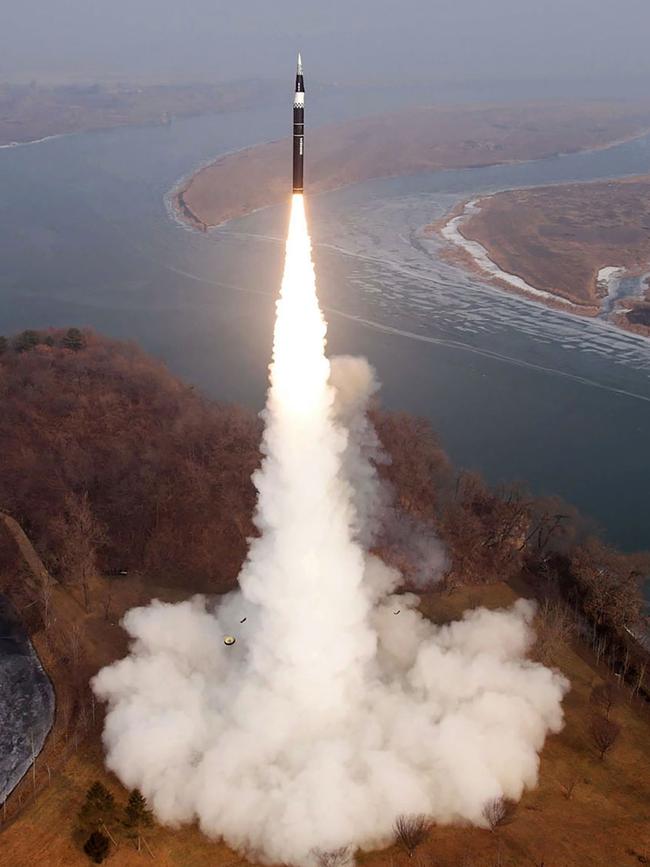
And dictator Kim Jong-un is in an unprecedentedly powerful position.
The civil war between North and South Korea that began in 1950 has never officially ended.
For decades, the North has been isolated by both international sanctions and the Kim dynasty’s draconian administration.
But Kim’s now forged a strong relationship with embattled Russian President Putin.
He’s swapped troops and artillery for cash and technology.
And South Korean politics have handed him an unexpected opportunity with President Yoon Suk Yeol’s chaotic alleged attempt to seize power through imposing martial law.
“A prolonged period of division and uncertainty is likely in South Korea,” predicts Garlauskas. “This will make it difficult for Seoul to deter Pyongyang’s aggression and co-ordinate with the incoming US administration.”
Kim also has powerful new ballistic and cruise missiles.
“These are backed by an increasingly credible nuclear threat – underscored by multiple nuclear tests, repeated intercontinental ballistic missile launches, and displays of tactical nuclear weapons – which could give Seoul and Washington pause about responding,” Garlauskas adds.
Middle East: Apocalypse soon?
“Will post-Assad Syria unify disparate opposition groups? Or will it remain a failed state, only this time, run by Islamists?” asks the CFR’s Froman.
“As for Iran, will 2025 be the year the country races to develop an actual nuclear capability?
“And then there is the Israel factor: Israeli leaders are filled with confidence after defying outside entreaties to end the war in Gaza and de-escalate their country’s conflicts with Iran and Hezbollah. Euphoric and emboldened, they may decide that this is the year to strike Iran’s nuclear program and set it back years.”

Israel. Palestine. Lebanon. Syria. Yemen. Iran.
All are names deeply associated with brutal conflict.
And their future, like their past, remains likely to be painful.
Especially now Iran seems set to join Israel as a nuclear power. And Saudi Arabia has expressed a desire to follow suit.
“Israel has just months to damage Iran’s nuclear program or risk Tehran attaining a nuclear weapon,” warns Jennings.
“I suspect the only thing holding back Israeli Prime Minister Benjamin Netanyahu is equivocation from the Biden White House.
“The Trump administration will most likely support a strike. That means providing targeting assistance and weapons able to dig deep into buried nuclear facilities.”
Jamie Seidel is a freelance writer | @jamieseidel.bsky.social
Originally published as ‘Dark momentum’: Experts sound grim warning over global threats facing Australia in 2025





